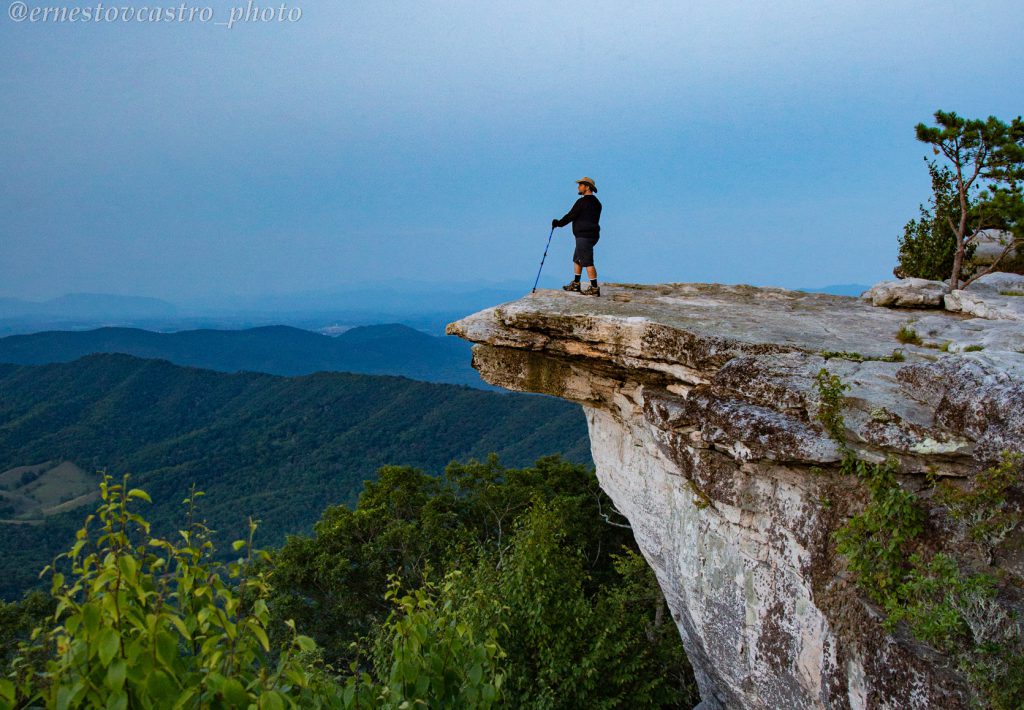
Imagine spending a whole summer hiking epic American routes like the Appalachian Trail and the Pacific Crest Trail – and calling it research.
That’s what PhD student Ernesto Viveiros de Castro did in the summer of 2022 as part of his doctoral research for SNRE’s Interdisciplinary Ecology program. Ernesto is studying the impact such long-distance trails have on conservation, which requires him to weave social science concepts into his knowledge of ecology and natural resource management. Before embarking on his PhD, Ernesto managed the National Park of the Serra dos Órgãos in his native Brazil. A decade ago, he led the creation of Brazil’s Atlantic Forest Trail, which stretches more than 4,000 kilometers along one of the most threatened biomes in the world. Since then, his passion has been nature-based tourism and exploring its vast potential for conservation.
We spoke with Ernesto about his summer fieldwork interviewing hikers in North America’s great wildernesses, and the career path that led him to his PhD.
Tell us about your doctoral research. What questions are you hoping to answer?
My general interest is to assess the contribution of long-distance trails to nature conservation. As this contribution can occur in different ways, it is important to use complementary approaches. So, I’m trying to assess the influence of trail experiences on hikers in terms of their sense of place and connection to nature; assess the effect of trails on the economy and identity of local communities; and assess whether these trails influence the connectivity of habitats along them, potentially playing a role as ecological corridors.
You received a Robin E. Nadeau Graduate Research Award in 2022, to help fund your summer field work. Tell us about the research you conducted on the U.S. National Scenic Trails.
The Robin E. Nadeau Ecology Graduate Research Grant was essential in making my field trip possible. I chose to interview hikers in person and on the trail, as well as interested parties in many local communities. I drove over 20,000 miles and hiked around 300 miles along the Appalachian Trail, the Pacific Crest Trail, and the Continental Divide Trail to interview over 600 hikers and nearly 60 managers and local residents in trail towns.

What was it like interviewing hikers on the trails? Is there anything you wished you could have done differently?
Interviewing hikers on the trail made a difference because I could access people who would be unlikely to respond to an online survey. The response rate was very good, and few people refused. Many were even interested in the research, and we talked a lot after the interviews, which also helped me to understand how these experiences influence people.
I chose 18 popular and remote trail sections to represent different hiker profiles. At some sites, I had to wait up to five days for at least 30 people to show up for an interview. It was an incredible experience, and despite the hard work, I enjoyed it a lot. I would have liked to have more time for longer hikes, experiencing these long-distance trails more in depth.
What first sparked your interest in nature-based tourism?
Since I was a teenager, I loved visiting national parks and hiking in Brazil. This influenced my academic choice, and I majored in biology. Shortly after finishing my master’s degree in ecology, I joined the federal agency for protected areas in Brazil (ICMBio) and soon became superintendent of one of the most important national parks in the country. Since then, I started to work directly in the management of nature-based tourism.
In 2012, I proposed the first Brazilian mega-trail, the Atlantic Forest Trail, and I got more and more involved in the subject. My involvement goes beyond work and on every vacation I try to travel to national parks in different countries. I also ended up becoming a nature photographer and have already published a photographic book about the Atlantic Forest Trail. During the pandemic, I created an Instagram profile to feature parks and trails around the world (ernestovcastro_photo), but I’ve been a bit stuck in this final phase of my PhD.
What made you choose the Interdisciplinary Ecology PhD program at UF?
My research is essentially interdisciplinary, and I wanted to complement my background in ecology with knowledge in social sciences. SNRE is perfect for this. I took more courses in the social area, but I try to combine them with my previous knowledge and my professional experience.
What do you hope to do after your complete your PhD?
I am here on leave from the Brazilian parks agency and will be back there after finishing my PhD. I hope to put into practice the knowledge I acquired here in the United States for the implementation of the Atlantic Forest Trail and the management of Brazilian national parks.
 4
4
